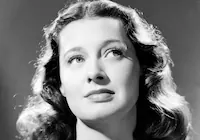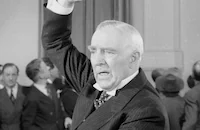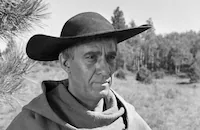Night of January 16th
Brief Synopsis
Cast & Crew
William Clemens
Robert Preston
Ellen Drew
Nils Asther
Clarence Kolb
Willard Robertson
Film Details
Technical Specs

Synopsis
Board members of the New York Faulkner Corporation demand that their president inform them why $20 million is missing from the company fund. President Bjorn Faulkner refuses to answer and that night meets with a mysterious associate who uses the pseudonym "Anton Haraba." A struggle breaks out between the two men, and Faulkner is apparently murdered when his body falls from the balcony of his penthouse apartment. Kit Lane, Faulkner's private secretary, is arrested for his murder because she is found in the penthouse where she rushed after the dead man's hand hit the intercom to her apartment. Board member Steve Van Ruyle, who recently inherited his position from his uncle, is distressed to learn that his $3 million may have disappeared. He convinces the frantic Faulkner board members that Kit must have been in on an embezzlement plan with Faulkner. With the consent of the board, Steve bails Kit out of jail in order to find out her involvement and soon gets his hands on Faulkner's private diary, in which Haraba's name is noted, followed by a series of numbers and dates. Kit is indicted for Faulkner's murder and the circumstantial evidence at the trial weighs heavily against her. Now sympathetic to Kit, Steve convinces her defense attorney to adjourn the trial to Faulkner's apartment, where he expects him to prove that Kit neither had the time nor the ability to emerge from Faulkner's private elevator and hurl him from the balcony on the night of his death. However, when an attorney proves that Steve bribed the elevator repairman to slow the elevator for the demonstration, Steve escapes with Kit and finds refuge in the apartment of Oscar, a drunken stranger. Kit studies Faulkner's statuette of Atlas supporting a globe, which Steve had pocketed, and notes that several cities marked with jewels represent the cities in which Faulkner had investments. She realizes that she can spell out the name "Haraba" with the first letters of each city and that the investments listed in the diary come out to $20 million. With the further realization that Faulkner intended to go to each city on the date indicated and withdraw the money, Steve convinces the board members to buy them a ticket to Havana, the last city in the book. In Havana, Steve and Kit impersonate a married couple and after an exhaustive search at various hotels, learn that Haraba is checked into their own hotel. They page Haraba, knowing that whoever he is, he must be the killer, and while Steve instructs the hotel bartender on how to mix his favorite unique drink, Kit goes to her room to change. She is shocked to find Faulkner there and realizes that he killed Haraba and dressed him in his clothes so that the mutilated corpse would be identified as he. Faulkner takes Kit to his room and at the same time, Steve is arrested by the Cuban police. They take him to get Kit, and when he finds her gone, he is tipped off by a waiter going to Faulkner's room with his favorite drink concoction, about which only Kit could know. He rushes to Faulkner's room in time to save Kit from death, and New York police inspector Donegan, working with the Cuban police, arrives to arrest Faulkner. Kit and Steve are freed and rather than continuing to impersonate a married couple, they marry.

Director
William Clemens
Cast

Robert Preston

Ellen Drew

Nils Asther

Clarence Kolb
Willard Robertson

Cecil Kellaway

Donald Douglas
Paul Stanton

Margaret Hayes

Alice White
Jean Phillips
Rod Cameron
Keith Richards
Paul Irving
Georges Renavent

James Flavin
Edwin Stanley
Harry Hayden

Roy Gordon
Cliff Nazarro
Frank Dae
Harry A. Bailey
Broderick O'farrell
J. W. Johnston
Jack Richardson
Hayden Stevenson
George Guhl

Byron Foulger
Eric Wilton
Norman Ainsley
Gus Glassmire
Sam Ash
A. S. "pop" Byron
Pat West
Buddy Williams
John Erickson
Jack Minton

Martin Garralaga
Rafael Storm
Francisco Maran
Gohr Van Vleck
Sven-hugo Borg
Pedro Regas
George Mari
Jose Luis Tortosa
Danton Ferrero
Philip Van Zandt
Jesús Topete
Jack Chapin
Edward Gargan
Bruce Mitchell
Jack Carr
Brady Kline
Isabelle Lamal
Grace Hayle
Edgar Dearing
Arthur Loft
Charles Mcmurphy
Leon Belasco
Crew
Doris Anderson
Gerard Carbonara
John Cope
Delmer Daves
Haldane Douglas
Hans Dreier
Kenneth Earl
Eve Greene
Hugo Grenzbach
Ellsworth Hoagland
Curtis Kenyon
Brian Marlow
John Mescall
Robert Pirosh
Sol C. Siegel
Joseph Sistrom
George Templeton

Film Details
Technical Specs

Articles
Ellen Drew, 1914-2003
She was born Esther Loretta "Terry" Ray on November 23, 1914, in Kansas City, Missouri. The daughter of a barber, her family moved to Chicago when she was still an infant and she lived a very quiet childhood far removed from the glamour of Hollywood. She was encouraged by some friends to enter a beauty contest when she was just 17. After winning, she tried her luck in Hollywood, but found that they were no immediate offers for her particular talents.
She eventually took a waitressing job at C.C. Brown's, a famed Hollywood Boulevard soda fountain, and had virtually abandoned her dreams as a starlet when William Demarest, a popular actor's agent and well-known character actor, spotted her. Demarest arranged a screen test for her at Paramount, and she was promptly placed under contract for $50 a week.
For the first few years, (1936-38), Drew got only bit parts, and was often uncredited. When she finally got prominent billing in the Bing Crosby musical Sing You Sinners (1938), she decided to change her name, from Terry Ray to Ellen Drew. She earned her first major role in Frank Lloyd's If I Were King (1938) opposite Ronald Colman, yet for the most part of her career, rarely rose above "B" material and second leads. Still, she had some fine exceptions: Preston Sturges' enchanting comedy Christmas in July (1940), with Dick Powell; Tay Garnett's lighthearted war romp My Favorite Spy (1942) co-starring Kay Kyser; Julien Duvivier's taut The Imposter (1944), holding her own with a brooding Jean Gabin; and Mark Robson's chilling low-budget chiller Isle of the Dead (1945) opposite Boris Karloff. Drew made some notable television appearances in the late '50s including Perry Mason and The Barbara Stanwyck Show, before retiring from the entertainment industry. She is survived by her son David; five grandchildren; and five great-grandchildren.
by Michael T. Toole

Ellen Drew, 1914-2003
Quotes
Trivia
Notes
The working titles of this film were Private Secretary and Secrets of a Secretary; the latter was also the title of a 1931 Paramount production that is unrelated to this film. Night of January 16th was the first film based on a work by novelist and philosopher Ayn Rand. Under the title Woman on Trial, the play had its premiere in Los Angeles, CA in 1934. When it was performed on Broadway, where it was a hit, the opening scene portrayed the court trial of "Karen Andre" ("Kit Lane" in the film), who is being tried for Faulkner's murder. A jury would then be selected from the theatre audience and they voted on a verdict, which then determined the ending of the play. Rand wrote two endings to accommodate either verdict, and according to contemporary reviews, the audience members comprising the jury were paid Equity wages. The Hollywood Reporter review noted that only "the barest outline" of the original plot survives in the film.
According to news items, RKO, where Rand worked as an extra and wardrobe woman, purchased the rights to Rand's play in January 1939, intending to produce a film starring Claudette Colbert or Lucille Ball. Paramount then purchased the play in July 1939. In April 1940, Paramount filed a $170,000 suit against actor Don Ameche after he withdrew from this film because he felt the main character was not suitable for his portrayal. Ameche had been loaned to Paramount in a special deal that would have added Barbara Stanwyck to the cast. In September 1940, Paramount dropped its lawsuit after Ameche agreed to appear in Kiss the Boys Goodbye. The film was then tentatively recast with Ray Milland and Paulette Goddard. Director William Clemens was loaned by Warner Bros. for this film.














